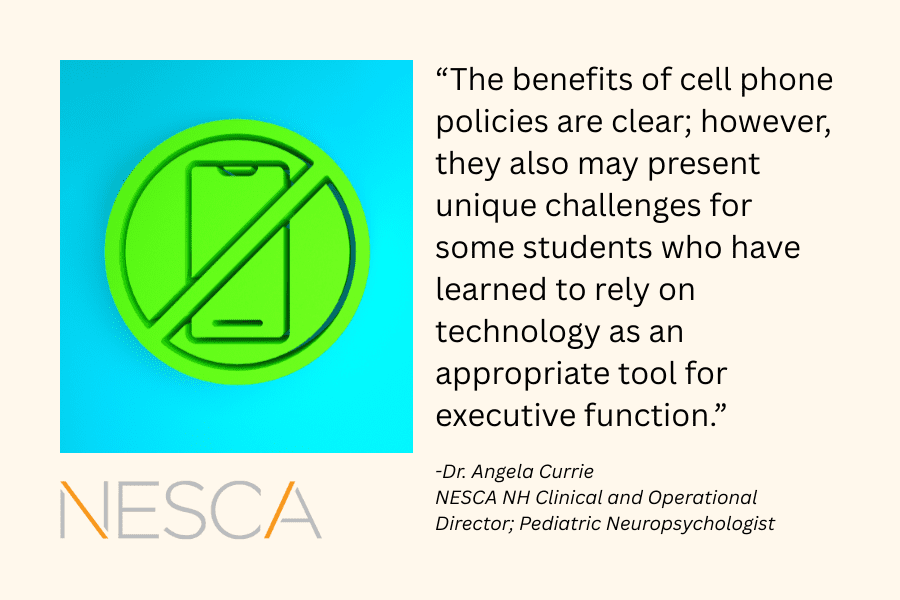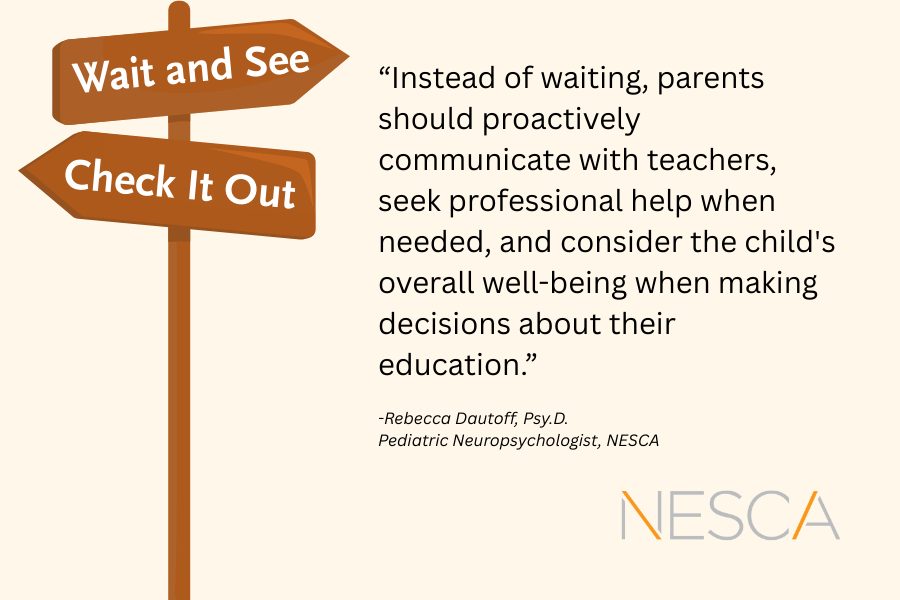
 By Angela Currie, Ph.D.
By Angela Currie, Ph.D.
Pediatric Neuropsychologist; Londonderry, NH Director, NESCA
As students head back to school this fall, many are facing new policies and restrictions around cell phone use in school. For many states and districts, this is defined by a “bell to bell” cell phone ban, which prohibits students from using their phones from the first bell to final dismissal. For many, these policies are long awaited, as there has been growing concern about student distraction, social disengagement, and the negative impact of social media access in schools. By removing access to cell phones, tablets, and smart watches, “bell to bell” policies aim to reduce distractions and foster a more focused, interactive learning environment.
The benefits of cell phone policies are clear; however, they also may present unique challenges for some students who have learned to rely on technology as an appropriate tool for executive function. Executive function refers to a set of cognitive and self-management skills that help individuals manage time, stay organized, remember information, and meet goals efficiently. Because cell phones and tablets are readily accessible and have many embedded tools, many students have integrated technology into their daily routines, using features like calendars, alarms, and note-taking apps to stay on top of assignments and deadlines. These digital tools have become a practical way for some students to stay organized and ensure they are meeting expectations.
With “bell to bell” cell phone bans in place, students will no longer have “on demand” access to the apps or other executive function tools that previously kept them organized, possibly raising concern about increased forgetfulness, missed assignments, and heightened stress. Positively, the laws provide exemptions for students whose IEP, 504 plan, or Title IX needs identify specific technology accommodations (e.g., insulin monitoring, assignment log, communication tools, etc.). However, these students may feel hesitant to use their devices during the school day out of concern for standing out or feeling stigmatized. As a result, even students who are permitted to use their devices may choose to find alternative ways to manage their academic demands in order to avoid feeling singled out.
Cell phone policies are being developed for good reasons, but within this landscape, schools and families must start thinking about how to teach executive function strategies that are not technology-based. Children and teens are developing in a technological world, and they may not have the skills for managing demands without these supports. This provides an opportunity for them to learn more independent skills for daily management, but they may not figure this out on their own. To support students, educators and parents can introduce practical strategies, such as using physical planners to track assignments and deadlines, breaking down larger projects into smaller, actionable steps, and organizing materials with color-coded folders or checklists. Teaching time management techniques, encouraging regular routines, and modeling how to prioritize tasks can also help students build the foundational skills they need to succeed both in and out of the classroom, even without the constant aid of technology.
Ultimately, cell phone bans have the potential to create a more focused and engaged learning environment, fostering improved learning and social interactions. However, as access to technology is reduced, it becomes increasingly important for schools to provide explicit instruction in executive function strategies. By offering concrete tools and strategies, educators can help all students develop enduring, life-long skills that will benefit them not only in managing their responsibilities at school, but also in their future personal an
About the Author
To book an evaluation with Dr. Currie or one of our many other expert neuropsychologists, complete NESCA’s online intake form. Indicate whether you are seeking an “evaluation” or “consultation” and your preferred clinician in the referral line.
NESCA is a pediatric neuropsychology practice and integrative treatment center with offices in Newton, Plainville, and Hingham, Massachusetts; Londonderry, New Hampshire; and staff in greater Burlington, Vermont, serving clients from infancy through young adulthood and their families. For more information, please email info@nesca-newton.com or call 617-658-9800.

